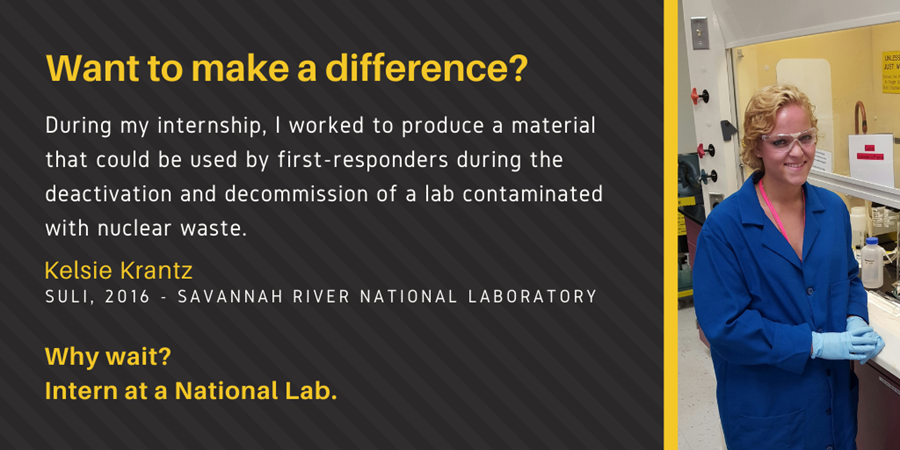Kelsie Krantz
Former SULI Intern Synthesized Materials for Use by First-Responders During Decommission of Labs Contaminated With Nuclear Waste

Internship program: SULI
Term and year: Summer 2016
Undergraduate institution: West Virginia Wesleyan College
Major: Chemistry
Host DOE laboratory: Savannah River National Laboratory, Aiken, SC
Mentor name: Aaron Washington
What was your research topic during your internship?
During my internship, I worked on a project where we synthesized foam samples containing different additives. The ultimate goal was to produce a material that could be used by first-responders for the deactivation and decommission of a lab contaminated with nuclear waste. Working on this project was extremely interesting to me because I was able to develop a new product and test samples on different radioactive sources to generate the most effective formula. I was able to be involved with the entirety of this effort and independently make my own samples. Not only did I become a more self-sufficient researcher during this internship, but my eyes were opened to the world of nuclear chemistry.
What was it like coming to a National Lab for your internship?
I came to Savannah River National Laboratory (SRNL) from a small liberal arts college. As a chemistry student who learned about the equipment used for research in books, but never had the opportunity to ever operate them, I was awestruck when touring the facilities at SRNL. The day I used the Scanning Electron Microscope at SRNL is a day I will never forget. Additionally, I was used to a hands-on and welcoming environment at my undergraduate institution, and I was so thankful to find a similar environment at SRNL. Everyone I worked with was so inviting and helpful during my transition to a new location.
What do you currently do, and where do you hope your career takes you?
I am currently in graduate school at the University of Virginia. I am a fourth year Ph.D. candidate working under Prof. Robert J. Gilliard, Jr. In his lab I lead the materials effort and synthesize hybrid inorganic-organic molecules for applications in energy conversion and artificial lighting technologies. After obtaining my Ph.D., I aspire to become a postdoctoral researcher in a lab focusing on polymer synthesis, to later develop a career as a cosmetic chemist.
Think of a time you experienced success during your academic or professional career . What did this success look like?
At the beginning of my first year of graduate school, I chose to join a brand-new faculty member’s lab. Due to this choice, there was no previous graduate student’s work as a starting point for me. I had to start from nothing and work diligently to develop the necessary synthetic routes, characterization methods, and purification techniques. After two arduous years of troubleshooting and hard work, I was finally able to publish my first article describing my graduate work. I was so proud of my perseverance, and I learned a tremendous amount about myself in the process. Conquering these challenges in lab taught me that I am self-sufficient and that I do not always need all of the help and guidance I think I do. Since then, I have become a more independent researcher and a more critical thinking scientist.
Think of a time you experienced failure during your academic or professional career. How did you feel at the time? How did you deal with the failure and work past it?
I won the Outstanding Senior Chemist award during the final year of my undergraduate career and was one of the top chemistry majors in my class. Therefore, failure was not really something I was familiar with until arriving at graduate school. From day one, I dealt with failed experiments for months on end, and was struggling in my coursework as a result of being completely swamped with so many different things at once. I was devastated that my reactions were not working as planned and that my grades were not as high as I wanted. Rather than giving into the urge to give up and quit graduate school, I used my failure as motivation. Before I knew it, I had passed all of my classes, my experiments were starting to work, and my self-confidence gradually increased.
Did you make any important personal connections during your internship?
When participating in my internship at SRNL, I made connections with phenomenal scientists and just all-around amazing people. Dr. Aaron Washington II was my mentor that summer. I not only learned chemistry from him, but I was inspired by his success and motivation and enthusiasm for his work. I still keep in touch with Dr. Washington II and Natalie Ferguson [the Internship Program Manager at SRNL]. Their impact on my academic career has been immeasurable, and for that I am extremely grateful.
What are your values? How do express your values through your academic or professional career?
I strive to be an honest, helpful, patient, and respectful researcher. I strongly believe these values are expressed throughout my academic career because I have always made an effort to be a leader to the new students in our lab and maintain professional composure during hardships. Additionally, as one of the more senior graduate researchers in my lab, I mentor two undergraduate students. With this position, I aspire to teach them as much about chemistry lab techniques as possible while also being the support they need to become strong women in science. I truly believe that my core values have strengthened and shaped me into the successful chemist that I am today.
Related Links:
Hear from Kelsie and other SRNL interns about their research and experience at the lab:

Kelsie Krantz in Dr. Aaron Washington's lab at SRNL, 2016.


